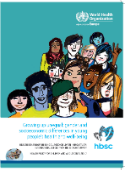Growing up unequal. HBSC 2016 study (2013/2014 survey)

Download
Edited by: Jo Inchley, Dorothy Currie, Taryn Young, Oddrun Samdal, Torbjørn Torsheim, Lise Augustson, Frida Mathison, Aixa Aleman-Diaz, Michal Molcho, Martin Weber and Vivian Barnekow
Health Policy for Children and Adolescents, No. 7
2016, xiv + 277 pages
ISBN 978 92 890 5136 1
CHF 60.00/US$ 72.00
In developing countries: CHF 42.00/US$ 50.40
Order no. 13400170
This book is the latest addition to a series of reports on young people's health from the Health Behaviour in School-aged Children (HBSC) study: a WHO collaborative cross-national study that has provided information about the health, well-being, social environment and health behaviour of 11-, 13- and 15-year-old boys and girls for over 30 years. This book presents findings from the 2013/2014 survey on the demographic and social influences on the health of almost 220 000 young people in 42 countries and regions in the WHO European Region and North America. Responding to the survey, the young people described their social context (relations with family, peers and school), health outcomes (subjective health, injuries, obesity and mental health), health behaviour (patterns of eating, tooth brushing and physical activity) and risk behaviours (use of tobacco, alcohol and cannabis, sexual behaviour, fighting and bullying). For the first time, the report also includes items on family and peer support, migration, cyberbullying and serious injuries.
Statistical analyses were made to identify meaningful differences in the prevalence of health and social indicators by gender, age group and levels of family affluence. The findings highlight important health inequalities and contribute to a better understanding of the social determinants of health and well-being among young people.
Through this international report on the results of its most recent survey, the HBSC study aims to supply the up-to-date information needed by policy-makers at various levels of government, nongovernmental organizations and professionals in sectors such as health, education, social services, justice and recreation, to protect and promote young people's health.
Data presented in this report can be accessed at the WHO European Health Information Gateway and via the WHO European health statistics application for mobile telephones.



